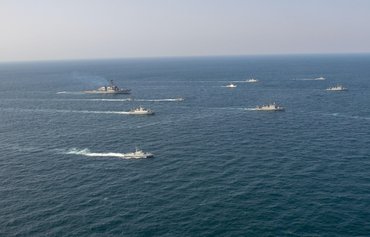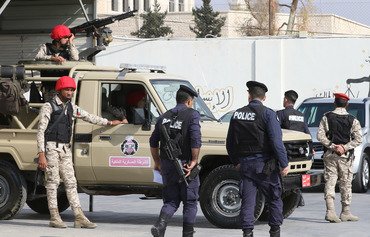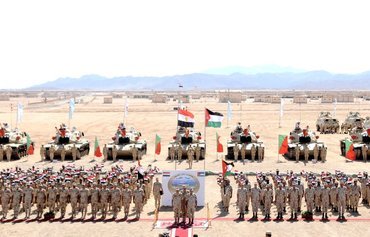Training programmes and military exercises conducted by US forces alongside regional armies are the backbone of the region's security, experts say.
These drills put local forces in a better position to fight terrorist and extremist groups, enhance rule of law, and counter interference from malign groups or regimes, most notably Iran, they said.
The joint manoeuvres and training programmes taking place in Iraq, Saudi Arabia, Qatar, Kuwait, Lebanon and Egypt, among other regional countries, "are showing quick results in terms of improved security and effectiveness of performance", said Badr Hammadi, a security expert and researcher at the University of Bahrain.
"Last year witnessed tremendous improvement in the level of training, live manoeuvres, joint workshops and periodic lectures, which solidified the security situation and enhanced the effectiveness of the various security forces," he told Al-Mashareq.
The joint exercises are important, he said, "and this co-operation can be considered as the backbone of [the region's] security and military forces".
The improvement in performance can be seen in troops' practical training and readiness to deal with difficult conditions, rescue and evacuation operations in the event of natural disasters or crises, he said.
It also is evidenced by the forces' commitment to adhering to human rights and professional work standards, he said.
"Without a doubt, those who have the opportunity to co-operate and train with the US forces are usually better than their peers," Hammadi said.
Accelerating the return of IDPs
The Peshmerga Forces received a series of field training courses from US forces in 2018 and 2019 that helped raise fighters' level of effectiveness in confronting the "Islamic State of Iraq and Syria" (ISIS) and maintaining security, said Secretary General of the Ministry of Peshmerga in Iraq Jabbar Yawar.
"Training and the acquisition of experience ensure the security of citizens and we value the central role that the US forces play in this regard," he told Al-Mashareq.
With the improved security situation, many internally displaced persons (IDPs) have been able to return to their homes, he said.
The training US forces provide to local forces is comprehensive, said Fouad Ali, an Iraqi security expert and advisor to Anbar's local government.
Army forces and the Counter-Terrorism Service received training on fighting in close quarters, freeing hostages, dismantling mines and explosives, tracking terrorist elements in inhabited alleyways and streets, as well as training on combat skills and hunting down terrorist pockets in the desert and mountainous areas, he told Al-Mashareq.
"US Army programmes launched years ago have contributed to protecting tens of thousands of Iraqis from certain death," he said.
"Any decline in or suspension of this support means the level of threat to the safety of civilians will certainly increase," he added.
US commitment to safety of region
In Saudi Arabia, training programmes and military drills have not only developed qualified commanders, officers and troops, but also enhanced skills on analysing information, tracking terrorist hotbeds, and pursuing extremists and various threats in the region, said Col. (ret.) Hamad bin Salem al-Dawsari, a lecturer at King Fahd Security College in Riyadh.
"We find that the language problem no longer presents an obstacle to local forces in such programmes, but rather [it provides] an incentive to learn languages, become acquainted with [other] cultures, and also build friendly and amicable relations with other peoples," al-Dawsari said.
The programmes "are a practical demonstration of the US's commitment to the security of the region and the Arabian Gulf in particular", he said.
In 2020, the US will conduct several exercises to reinforce partnership, interoperability and crisis response.
They include Native Fury bilateral exercise in the UAE from March to April, as well as Iron Falcon air force exercise in the UAE, Eagle Resolve in Kuwait and Iron Defender naval exercise in Oman, all of which will be held in March.
The Bright Star multilateral field training exercise also will be held in Egypt in September.

![Peshmerga forces received training by US forces in September 2019. [Photo courtesy of the Kurdish Region's Ministry of Peshmerga]](/cnmi_am/images/2020/01/30/22143-us-exercises-region-600_384.jpg)






